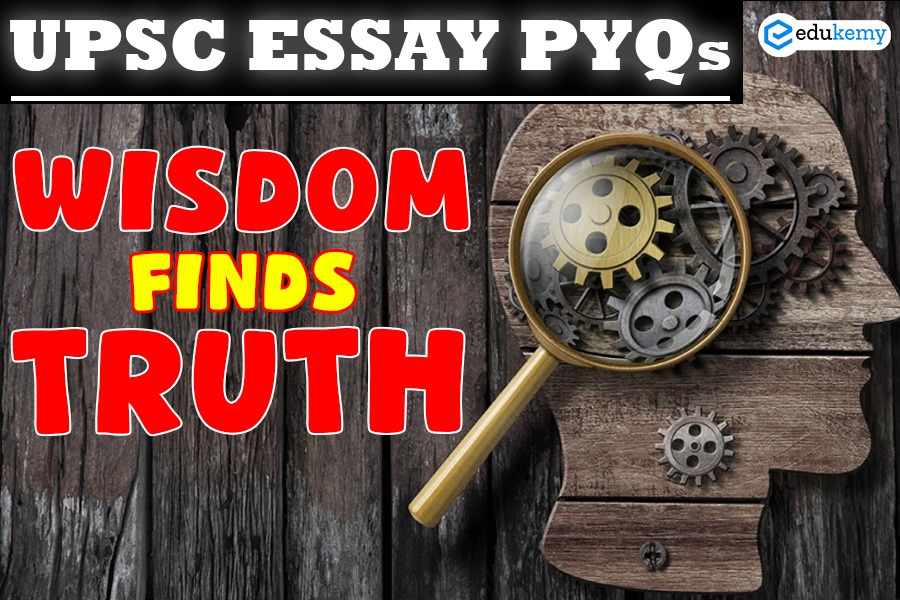1.5K

Explore “Wisdom Finds Truth” from UPSC Essay PYQ 2019, analyzing how wisdom leads to truth through experience, ethics, and cultural insights.
Contents
Essay Key
| Component | Details |
|---|---|
| Essay Topic | Wisdom Finds Truth |
| Paraphrase | This essay delves into the relationship between wisdom and truth, emphasizing how wisdom—through discernment, understanding, and experience—guides individuals toward uncovering deeper truths.. |
| Intent of the Essay | The essay aims to explore how wisdom helps uncover truths in different areas of life, such as personal experiences, societal issues, and philosophical thought. |
| Keywords | Wisdom, Truth, Discernment, Understanding, Experience |
Key Arguments
1. Wisdom as a Multifaceted Concept
- Combines knowledge, experience, and sound judgment.
- Varies across cultures and individuals, making it a subjective concept.
- Evidence: Eastern and Western philosophies offer different perspectives on the nature and practice of wisdom.
2. Experience as a Source of Wisdom
- Personal experiences shape one’s understanding of complex truths.
- Failures often lead to valuable insights that deepen wisdom.
- Evidence: Empirical studies show that experiential learning is more effective than purely theoretical learning.
3. Wisdom in Ethical Decision-Making
- Wise individuals weigh ethical implications before acting.
- Truth gains greater meaning when aligned with moral responsibility.
- Evidence: Case studies of ethical leaders show how wisdom contributes to responsible and truthful decision-making.
4. Wisdom’s Role in Social Harmony
- Wise leadership fosters trust and helps resolve social conflicts.
- Encourages empathy and mutual understanding, key for societal growth.
- Evidence: Nelson Mandela’s leadership during post-apartheid South Africa demonstrates wisdom in action.
5. Philosophical Insights on Wisdom and Truth
- Philosophers like Socrates saw wisdom as essential for discovering truth.
- Wisdom connects knowledge with virtue and ethical living.
- Evidence: The Socratic method promotes inquiry and critical thinking as tools for uncovering deeper truths.
Case Studies/Examples
| Case Study | Key Insights | Relevance |
|---|---|---|
| Nelson Mandela’s Leadership | Promoted reconciliation and peace through wisdom during post-apartheid South Africa. | Illustrates the role of wisdom in societal truths. |
| The Socratic Method | Advocated inquiry and dialogue to achieve deeper understanding. | Highlights the connection between questioning and truth discovery. |
| Indigenous Knowledge Systems | Emphasize experiential learning and holistic understanding of truth. | Shows how different cultures embody wisdom in understanding truth. |

Additional Tips
- Include historical instances of wise leadership and how it positively influenced societal progress.
- Delve into the philosophical contrast between wisdom and knowledge, highlighting how each plays a role in uncovering truth.
- Integrate relevant data or statistics that emphasize the value of wisdom in making sound decisions.
- Share personal anecdotes or real-life stories where wisdom helped reveal deeper truths or guided important choices.

